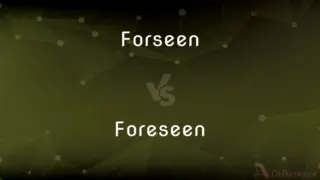Disagreeance vs. Disagree — Which is Correct Spelling?
Edited by Maham Liaqat — By Sumaia Saeed — Updated on April 28, 2024
Disagreeance is the incorrect spelling of disagree. Disagree means to have a differing opinion or not to consent to a viewpoint.

Table of Contents
Which is correct: Disagreeance or Disagree
How to spell Disagree?

Disagreeance
Incorrect Spelling

Disagree
Correct Spelling
ADVERTISEMENT
Key Differences
Focus on the root "agree" and the prefix "dis-" which means not or the opposite of, forming "disagree" directly.
"Disagree" is a straightforward verb without any need for the extra "-ance" at the end which complicates its form.
How Do You Spell Disagree Correctly?
Incorrect: Whenever I disagreeance, I try to be polite about it.
Correct: Whenever I disagree, I try to be polite about it.
Incorrect: I disagreeance; I think it's a great idea.
Correct: I disagree; I think it's a great idea.
Disagree Definitions
To have a different opinion; to not accord in opinion.
They often disagree on financial matters, but always find a compromise.
ADVERTISEMENT
To express a different view or to not support a suggestion.
He disagreed with the plan to cut costs by reducing staff.
To fail to agree, be at variance or in conflict.
The data disagree with the conclusions drawn in earlier studies.
To not match or be inconsistent with something.
The witness statements disagree in several key aspects.
To have a differing opinion
She disagrees with him on everything. They say it will rain, but I disagree.
To dispute or quarrel
When those two disagree, there is a lot of yelling.
To fail to correspond
Our figures disagree.
To cause adverse effects
Caffeine disagrees with me.
(intransitive) To fail to agree; to have a different opinion or belief.
Beg to differ
John disagreed with Mary frequently.
Bob says cats are friendlier than dogs, but I disagree.
(intransitive) To fail to conform or correspond with.
My results in the laboratory consistently disagree with yours.
To fail to accord; not to agree; to lack harmony; to differ; to be unlike; to be at variance.
They reject the plainest sense of Scripture, because it seems to disagree with what they call reason.
To differ in opinion; to hold discordant views; to be at controversy; to quarrel.
Who shall decide, when doctors disagree?
To be unsuited; to have unfitness; as, medicine sometimes disagrees with the patient; food often disagrees with the stomach or the taste.
Be of different opinions;
I beg to differ!
She disagrees with her husband on many questions
Be different from one another
To decline to give approval.
The board disagreed with the proposal, citing several potential risks.
Disagree Meaning in a Sentence
Many experts disagree on the best approach to climate change.
You can disagree without being disagreeable.
It's common to disagree with friends and still remain close.
We often disagree about what movie to watch.
It's healthy to disagree in a team, as it brings diverse perspectives.
You can disagree with someone's opinion but still respect it.
They tend to disagree on political issues.
Parents and children sometimes disagree on career choices.
It's rare for them to disagree about financial matters.
Historians often disagree about interpretations of events.
The committee members disagree about the allocation of funds.
Authors can disagree with critics about literary interpretations.
Professionals often disagree on methodologies.
Parents may disagree on parenting styles.
Experts disagree whether this technology will be beneficial.
Teachers sometimes disagree with educational policies.
I disagree with you on that point, but I understand your reasoning.
They frequently disagree on travel destinations.
Disagree Idioms & Phrases
Disagree without being disagreeable
To express differing opinions without causing offense.
It's important to learn how to disagree without being disagreeable.
Disagree on principle
To oppose something based on one's moral or ethical standards.
He disagreed on principle with the company's policy on animal testing.
Agree to disagree
To accept that a consensus cannot be reached and move on without hard feelings.
After a long discussion, we simply had to agree to disagree.
Disagree at every turn
To oppose consistently and frequently, especially in a confrontational manner.
They disagreed at every turn, making compromise impossible.
Disagree across the board
To disagree with all points or aspects being discussed.
The team disagreed across the board on the proposed changes.
Common Curiosities
Why is it called disagree?
It is called disagree because it combines the prefix "dis-" meaning "not" or "apart" with the verb "agree," denoting opposition to agreement.
What is a stressed syllable in disagree?
The stressed syllable in disagree is on the last syllable: dis-a-gree.
How do we divide disagree into syllables?
Disagree is divided as: dis-a-gree.
How is disagree used in a sentence?
They often disagree on where to go for dinner.
What is the verb form of disagree?
Disagree is itself a verb, in its base form.
What is the first form of disagree?
The first form of disagree is "disagree."
What part of speech is disagree?
Disagree is a verb.
What is another term for disagree?
Another term for disagree is dissent.
How many syllables are in disagree?
Disagree has three syllables.
What is the pronunciation of disagree?
Disagree is pronounced as /ˌdɪsəˈɡriː/.
What is the plural form of disagree?
The verb disagree does not have a plural form.
What is the root word of disagree?
The root word of disagree is "agree," with the prefix "dis-" added.
What is the second form of disagree?
The second form of disagree is "disagreed."
What is the opposite of disagree?
The opposite of disagree is agree.
What is the third form of disagree?
The third form of disagree is "disagreed."
Is disagree an abstract noun?
No, disagree is a verb, not a noun.
Is the disagree term a metaphor?
Disagree can be used metaphorically to denote opposition or difference in opinions.
Is the word disagree imperative?
Disagree can be used in the imperative form to give a command or instruction.
Which vowel is used before disagree?
Vowels are not typically used before verbs unless they are part of a phrase or clause.
What is the singular form of disagree?
The singular form is disagree.
Is the word “disagree” a Direct object or an Indirect object?
Disagree, being a verb, does not function as a direct or indirect object but may have direct or indirect objects related to it in sentences.
Which determiner is used with disagree?
Determiners are not typically used directly with verbs like disagree.
Which preposition is used with disagree?
The preposition "with" is commonly used with disagree, as in "disagree with someone."
Which article is used with disagree?
Articles are not typically used with verbs like disagree.
Is disagree a vowel or consonant?
The word disagree starts with a consonant.
Is disagree a countable noun?
Disagree is not a noun; it is a verb.
Is disagree a collective noun?
No, disagree is not a collective noun.
Is the word disagree Gerund?
The gerund form of disagree is disagreeing.
Is disagree a noun or adjective?
Disagree is a verb.
Is disagree an adverb?
No, disagree is not an adverb.
Is disagree a negative or positive word?
Disagree is generally considered a neutral word, though it can have negative connotations depending on context.
Which conjunction is used with disagree?
Conjunctions such as "and" or "but" can be used with disagree, as in "I disagree and think we should reconsider."
Share Your Discovery

Previous Comparison
Smooths vs. Smoothes
Next Comparison
Lemonene vs. LimoneneAuthor Spotlight
Written by
Sumaia SaeedEdited by
Maham Liaqat








































